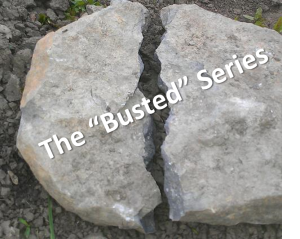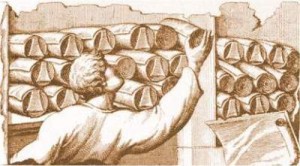The Christian church teaches that the four canonical gospels—the New Testament accounts of Jesus’ birth, teachings, death, and resurrection—were written by eyewitnesses to the events they describe, or by persons with access to eyewitness testimony. Church history tells us that the gospels of John and Matthew, for example, were written by two of Jesus’ original twelve disciples. The Gospel According to Mark was written, we are told, by a follower of Peter, another disciple. Finally, The Gospel According to Luke was apparently written by a companion of Paul who interviewed disciples and other eyewitnesses. As a result, the church argues that these documents reflect direct, eyewitness testimony, and are reliable historical documents. Continue reading
Category Archives: Historical Reliability of the Bible
Arguments suporting the Bible’s reliability as a collection of historical documents, with a particular emphasis on the New Testament
Busted (8): The Question of Jesus and the Demoniac
 The story of Jesus and the demoniac, as told in Mark 5, Matthew 8, and Luke 8 is a familiar one in which Jesus encounters a man possessed by a large number of demons. After a brief conversation, Jesus commands the “legion” to leave the man and enter a herd of nearby pigs. These pigs then rush down a steep incline and drown in the sea below.
The story of Jesus and the demoniac, as told in Mark 5, Matthew 8, and Luke 8 is a familiar one in which Jesus encounters a man possessed by a large number of demons. After a brief conversation, Jesus commands the “legion” to leave the man and enter a herd of nearby pigs. These pigs then rush down a steep incline and drown in the sea below.
To Bible critics, this story is a potential gold mine. Across these parallel accounts, they claim, we have both historical error and contradiction that clearly prove the Bible is neither inerrant nor even reliable. Continue reading
Contradictions (1): On Which Day Did Jesus Die?
 Critics point to alleged errors and contradictions in the Bible to show that it is neither inspired nor the work of eyewitnesses. These critics claim that if the biblical writers can’t agree on even the simplest details, how can we possibly believe what they have to say about important spiritual matters? One such charge is that the gospel writers cannot even agree whether Jesus was crucified on the first day of Passover or the day before Passover. Continue reading
Critics point to alleged errors and contradictions in the Bible to show that it is neither inspired nor the work of eyewitnesses. These critics claim that if the biblical writers can’t agree on even the simplest details, how can we possibly believe what they have to say about important spiritual matters? One such charge is that the gospel writers cannot even agree whether Jesus was crucified on the first day of Passover or the day before Passover. Continue reading
Busted (7): The Book of Acts Agrees With the Skeptics!?
Many anti-Christian commentators argue that the gospels and other New Testament documents, contrary to Church teaching, could not have been written by direct eyewitnesses to the events they describe. This is because, they argue, Jesus and his disciples were just simple, illiterate, Aramaic-speaking peasants who probably couldn’t write their own names, let alone a Greek gospel account. The argument is weak, and we have countered it in other articles (here and here).
However, there is another angle to this argument that we should address. Let’s allow Matthew Ferguson, a Ph.D. hopeful—and activist atheist—from UC-Irvine to lay it out for us: Continue reading
Busted (6): The Massacre of the Innocents…Did It Happen?
The second chapter of Matthew relates a story found in no other gospel, known as the Massacre of the Innocents. In this story, King Herod (the king of Judea and client of Rome) orders the killing of all boys less than two years of age in Bethlehem. Herod takes this “scorched earth” approach in a desperate attempt to find and kill the recently-born Jesus, who he believes will grow to become a threat to his throne.
Critics have long alleged that this story never happened, saying that the gospel author just made it up to create a fulfillment of prophecy. Continue reading
Busted (5): Did Luke Exhibit “Geographical Ineptitude?”
 Continuing with our “Busted” series, in this article we tackle the charge that Luke is an unreliable historian because he demonstrates in Luke 17:11 that he doesn’t even know basic geography. Here is the “offending” passage:
Continuing with our “Busted” series, in this article we tackle the charge that Luke is an unreliable historian because he demonstrates in Luke 17:11 that he doesn’t even know basic geography. Here is the “offending” passage:
Now on his way to Jerusalem, Jesus traveled along the border between Samaria and Galilee. (Luke 17:11, NIV) Continue reading
Busted (4): Did Luke Screw Up Pilate’s Job Title?
 In a previous article, we explored how critics falsely accuse Luke of gross inaccuracy in Luke 3:1. Here, we return to the same verse to explore another alleged mistake. Let’s review the relevant part of the passage, from the English Standard Version:
In a previous article, we explored how critics falsely accuse Luke of gross inaccuracy in Luke 3:1. Here, we return to the same verse to explore another alleged mistake. Let’s review the relevant part of the passage, from the English Standard Version:
In the fifteenth year of the reign of Tiberius Caesar, Pontius Pilate being governor of Judea,…
Some critics have pointed out that Luke refers to Pontius Pilate as the governor or “hegemon” (ἡγεμών) of Judea, rather than by his actual title, which was prefect (νομάρχης). If, the critics say, Luke was wrong about something that simple, then he surely was wrong about other things, too. Continue reading
Busted (3): Did Luke Get a Date Wrong by 60 Years?
 It seems that whenever one of the gospel accounts disagrees with that of a non-Christian historian, skeptical scholars assume it’s the gospel-writer who got it wrong. That’s a dangerous thing to assume.
It seems that whenever one of the gospel accounts disagrees with that of a non-Christian historian, skeptical scholars assume it’s the gospel-writer who got it wrong. That’s a dangerous thing to assume.
Luke 3:1 is a passage that many critics have used to “prove” Luke’s incompetence as an historian. Here’s the passage (ESV): Continue reading
Busted (2): Was Luke Wrong About the Jewish High Priest(s)?
 In this article, we tackle an alleged error in the Gospel of Luke that some critics use to paint Luke as an unreliable historian. Let’s take a look at the offending verse, Luke 3:2 (English Standard Version): “…during the high priesthood of Annas and Caiaphas, the word of God came to John the son of Zechariah in the wilderness.”
In this article, we tackle an alleged error in the Gospel of Luke that some critics use to paint Luke as an unreliable historian. Let’s take a look at the offending verse, Luke 3:2 (English Standard Version): “…during the high priesthood of Annas and Caiaphas, the word of God came to John the son of Zechariah in the wilderness.”
So, what is the alleged mistake? Continue reading
Busted (1): Synagogues Didn’t Exist In Jesus’ Time
Introducing the “Busted” Series
 The gospels, the book of Acts, and other New Testament documents have proven their worth as historically accurate documents over the centuries. Nevertheless, anti-Christian scholars persist in their efforts to paint the gospel writers as liars at worst and careless historians at best. Continue reading
The gospels, the book of Acts, and other New Testament documents have proven their worth as historically accurate documents over the centuries. Nevertheless, anti-Christian scholars persist in their efforts to paint the gospel writers as liars at worst and careless historians at best. Continue reading



